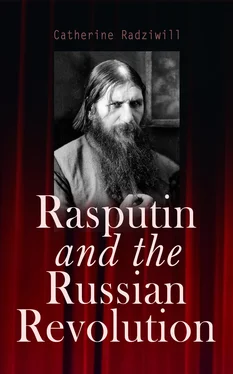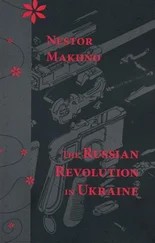In Russia, as a general rule, the people in power were all cringing before the Czar, whom they never dared to contradict. There were at the time I am writing about some Ministers who believed, or affected to believe, in all the extraordinary tales which it pleased Rasputin to repeat, and who thought it useful to follow the indications which it pleased him to give to them. He was only too delighted to be considered the most powerful personage in the whole of the Russian Empire. He helped as much as he could to accredit all the legends going about among the public in regard to his own person, and he imagined that the best way to add to his reputation as a man who did not care for the opinions of the world was to treat this world with disdain and with contempt, and to transform into his humble slaves ladies belonging to the highest social ranks, just as he had transformed into his hand-maidens the peasant girls who had fallen under his spell.
That he magnetised most of the people with whom he prayed seems but too true. Perhaps they did not notice it, and perhaps this was done with the consent of those on whom he exercised his hypnotic strength—it is difficult to know exactly—but that his prayer meetings were the scene of spiritist and magnetic experiences all who have ever been present agree in saying. He made no secret about the fact, and openly acknowledged the use which he made of the state of trance in which he liked to throw his disciples, especially those belonging to the weaker sex. He practiced to the full all the customs of the “Khlystys,” but he added to them a cunning such as is but rarely found in a human being, and a rough knowledge of human nature which gave him the facility to exploit the passions of the many vile people who thought that he was their instrument while in reality it was they who were playing fiddle to his tune.
After his return to St. Petersburg he applied himself to the task of setting aside all his former patrons, such as Illiodore, against whom he contrived to irritate several important members of the Holy Synod with false reports about remarks which the now disgraced monk was supposed to have made. He contrived also to bring about the exile of the Archbishop of Saratoff, Hermogene, from whom he feared disagreeable revelations concerning his own past life and certain episodes connected with the days when he had preached his so-called doctrine in the town and government of Saratoff. On the other hand, he toadied to other ecclesiastical dignitaries eager for promotion, and in that way obtained their support in the Synod. Very soon he turned his thoughts to more practical subjects than religious fervour or religious reforms, and sought the society of business and financial people. Among these he soon obtained the opportunities he longed for and established a kind of large shop or concern where everything in the world could be bought or sold, from a pound of butter to a minister’s portfolio.
It is no exaggeration to say that there was a time when nothing of importance ever occurred in the political, social and administrative life of the Russian capital that was not attributed to Rasputin, and the result of this was that there crowded about him all kinds of dark personalities, who hoped, thanks to his support and influence, to obtain this or that favour. Everything interested him, everything attracted his attention; railway concessions, bank emissions, stock exchange speculations, purchase of properties, acquisition of shares in industrial concerns, arranging of loans for persons in need of them—nothing seemed too small or too important for his activity. He liked to think himself necessary to all these high-born people, whom he compelled to wait for hours in his ante-chambers, just as if he had been a sovereign. And for every favour he granted, for every word which he promised to say, he exacted payment in the shape of a pound of flesh, which consisted, according to circumstances, in a more or less important commission.
Ministers and functionaries feared him. They knew that he could do them an infinitude of harm by causing to be circulated against them rumours of a damaging character, the result of which would have undoubtedly been their disgrace or removal to another sphere of action very probably not at all desirable. He was credited for an infinitude of things he had never thought of performing, and he was supposed to have been privy to all kinds of governmental changes that either pleased or displeased those who criticised them. As time went on one accused him among other things of the dismissal of the procurator of the Holy Synod, Mr. Loukianoff, with whom he had for a long period been at daggers drawn and who had openly expressed his disapproval of the “Prophet” and his disbelief in his miraculous powers. The elevation of the Archimandrite Warnava, one of his warmest patrons in the past, to the Episcopal See of Tobolsk was also said to have been Rasputin’s work, and the public persisted so entirely in seeing his hand everywhere and in everything that it was even rumoured that it was he who was answerable for the decision of the censor forbidding the representation of a drama by the celebrated author Leonide Andreieff called, “Anathema,” on the eve of the day when it was to be produced—a decision which caused an immense sensation in the society of the Russian capital.
It was natural that among the many people who crowded around Rasputin some secret police agents found their way. One of these who was later to become the hero of more than one scandal, a certain Mr. Manassevitsch Maniuloff, bethought himself of becoming the mentor of the “Prophet.” He was in close relation with Count Witte, always eager for his own return to power, and desirous of overturning every individual in possession of the posts which he had formerly occupied himself. The two men tried to imbue Rasputin with the idea that he had great political talents, and that it was a pity he had not yet turned these into account for the good and the welfare of Holy Russia. Rasputin did not believe in the sincerity of his newly acquired advisers, but he was shrewd enough to see that their help would be of wonderful value to him. He willingly entered into the plans which they unfolded to him between two glasses of brandy or two cups of champagne as the occasion presented itself. Count Witte was very well aware of all the secret influences which were paramount at Tsarskoie Selo, and he contrived to turn them in favour of Rasputin, suggesting at the same time to the latter the things which he ought to say, when in presence of certain personages. It was easy to throw in a word now and then, either in the shape of a jest, or of a remark uttered inadvertently and unintentionally, but yet sure to bear fruit in the future. The great thing was to give to Rasputin the idea that he was a personage of importance. This was not a very difficult matter considering the very high opinion which he already had of his own capacities, coupled with his set resolution to make the most hay whilst the sun was shining, and never to miss an opportunity of asserting his personality no matter on what occasion or with what purpose.
The Balkan war gave Rasputin a golden opportunity for exercising his various talents, and it is pretty certain that he made at the time strenuous efforts in favour of peace, repeating to whomsoever wished to hear him that he had had visions which predicted that the greatest calamities were awaiting Russia, if she mixed herself up in it. This feeling was shared by a numerous party, and the sovereign himself was the most resolute adversary of any military intervention in this unfortunate affair. It is likely that even without Rasputin Russia would not have drawn her sword either for Bulgaria or for Serbia, but nevertheless it pleased his friends to say that without him this would have most undoubtedly occurred. And it also pleased him to assert that on this occasion he had proved to be the saviour of his native land. We shall see him repeat this legend with great relish during a conversation which I had with him personally just before the breaking out of the present war.
Читать дальше












